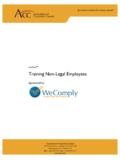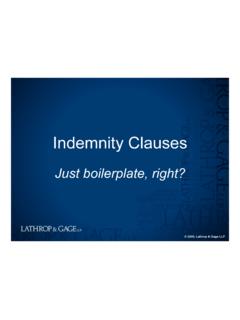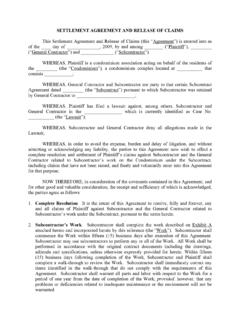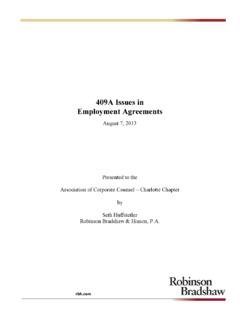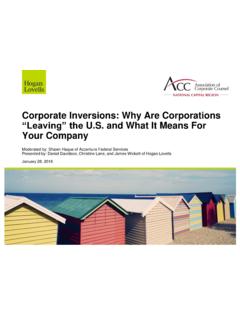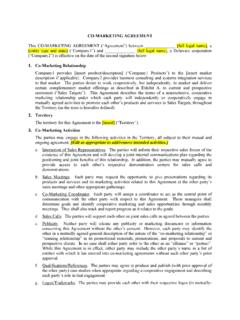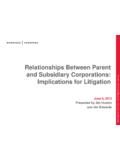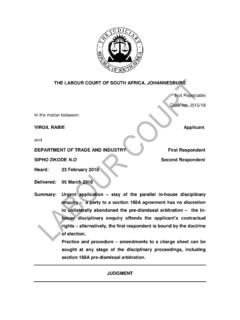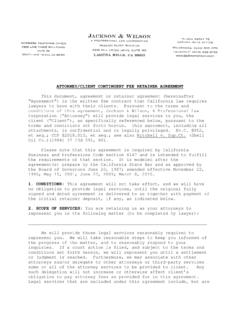Transcription of Sample Arbitration Clauses with Comments
1 Sample Arbitration Clauses with Comments BRIEF DESCRIPTION Arbitrations are creatures of contract. Thus, the parties can shape an Arbitration proceeding to a great extent in their Arbitration agreements. I have arbitrated dozens of cases as a sole arbitrator or as an Arbitration panel chair or panel member. My experience from that is that well-drafted Arbitration Clauses can greatly improve the process help save everyone money and poorly drafted ones can complicate the process and cost everyone extra money.
2 In some cases, inconsistent Clauses can even threaten the viability of the result of the Arbitration . Fortunately, by thinking ahead about the likely disputes that the parties could encounter and be required to arbitrate, you can help to shape the Arbitration a way that will ensure an efficient and fair process and result. BODY OF DOCUMENT When considering drafting an Arbitration clause, there are a number of basic questions to ask: 1. Should I arbitrate or litigate? That decision will turn in part on a number of factors.
3 First, is the importance of the dispute to your company? If the matter could be of great importance, you might prefer to have a full legal process including appeal. You will also want to consider whether any dispute in which your company is likely to be involved will require extensive discovery, which often is not allowed in Arbitration . In many cases, that is not a problem, so Arbitration would be an advantage because discovery is much less likely to get out of hand in Arbitration . You will also want to consider whether any likely disputes are more suitable for decision by a lawyer or other expert familiar with the technical or legal issues involved as opposed to a court or jury that probably will not be as familiar with such matters.
4 Arbitration will generally get your company a faster decision. 2. Where should the Arbitration take place? Of course, you will prefer your backyard, as will the company on the other side of the deal. Often, though, you can find a neutral place or convince the other side your location works for everyone. 3. Should we have an administered Arbitration ? Having a third-party administrator will involve payment of a fee and costs, but often is the best option. Administrators such as the American Arbitration Association, CPR or JAMS have access to extensive information about qualified arbitrators in the area of your dispute and make the process of arbitrator selection much easier.
5 Such administrators also typically help deal with issue of arbitrator disclosures to ensure impartial arbitrators. If you do not have an administered Arbitration , you will need to specify carefully the rules that apply. You need to be careful if you just adopt an organization s rules but not its jurisdiction, though, since the rules contemplate that the administrating organization will do the administrating. 4. Should we have a single arbitrator or a whole panel? Panels tend to bring more collective wisdom to bear on the issues, but tend to be about three times more expensive than a single arbitrator.
6 You will need to consider the size and importance of any likely disputes when drafting your Arbitration clause. 5. How much discovery should we allow? The parties are able to either expand the usual scope of discovery or contract it in their Arbitration agreement. If you want to be sure you receive documentary discovery, it makes sense to put that right in the agreement. If you think you will want some depositions, you should say so. Consider limiting them in number and duration. In many cases, it may be more important to limit the amount of discovery so the cost of the Arbitration doesn t overwhelm the amount in controversy.
7 6. Should we put specific time limits on the date of the hearing, the time for award and the like? It is not uncommon for parties to specify that a hearing will take place sixty days from filing, that awards will be entered in ten days and the like. For small disputes this may work out, but be careful. If the dates are not realistic, you will find yourself having to demand that your witnesses drop whatever they are doing to get ready for a quick Arbitration deadline. Generally, a good arbitrator will keep the proceedings on track without making the timing oppressive.
8 7. Should we require confidentiality of the Arbitration ? Arbitrators are bound to keep the Arbitration confidential. The parties, however, are not unless they agree. Thus, a confidentiality agreement in the agreement to arbitrate will preserve confidentiality, a significant benefit of the Arbitration process for those companies that prefer not to have their business disputes made public. 8. Should we provide for awards of attorneys fees and the expense of the Arbitration ? This will depend a great deal on the likely nature of any dispute.
9 Arbitrators are bound to uphold any contractual requirements of fee and cost shifting, so be sure that is what you want before you draft that in the agreement. 9. Do we want to have just a numerical award or do we want findings and conclusions or a reasoned award? Under some Arbitration rules, the default award is simply a numerical award, We find for the Claimant and against the Respondent in the amount of $X. If you want something more detailed, which many parties do, you can be sure you receive it by requiring it in the Arbitration agreement.
10 Most parties find findings and conclusions to be overkill, and opt for a reasoned decision, which gives the basic reasons for the decision and not all the detailed factual findings. While Arbitration awards are difficult to overturn as the grounds for review are very limited, there is virtually no chance of overturning an award that has no reasoning associated with it. Of course, you must pay the arbitrator or panel their normal hourly rates to write a more elaborate decision, which increases the cost. Some parties feel that the extra rigor that writing the reasons out brings to the decision-making process is worth the extra expense.

